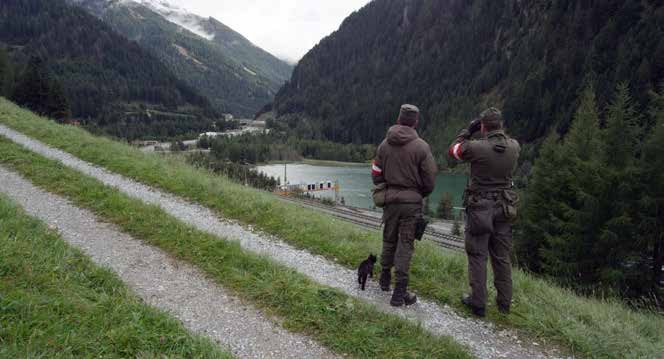(THIS ARTICLE IS MACHINE TRANSLATED by Google from Norwegian)
In his latest documentary, The Border Fence, the Austrian director Nikolaus Geyrhalter once again portrays the European fear of "The Other". His movie Abendland (2011) showed a series of scenes depicting Europe at night, with the main subject being surveillance cameras and border fences that keep strangers out. IN The Border Fence he takes the pulse of his life by it
Austro-Italian border region Tyrol. Early in 2016, Austrian politicians announced their plans to build a border fence in the Brenner Pass – which marks one of the most important traffic links between Northern Europe and Italy – to stop illegal refugees from Italy. Tyrol can thus be seen as a microcosm that reflects Europe as a whole where different ideas and anxieties collide.
Will protect paradise
The establishment of the Schengen area and the dismantling of the border guard was a revolutionary step for Europe. Thanks to this decision, Europe has been freed from unnecessary fences and walls. The border stations are no longer control mechanisms, but devices of the past. Traveling has become faster and more comfortable, and at the same time more humane.
The western guilt is most present throughout the film.
However, the refugee crisis has turned everything down. Hungary, Bulgaria, Macedonia, Slovenia and several other states have now begun to build border barriers and restore border controls. One of these fences was to mark the border between Austria and Italy in the Alps. Geyrhalter's camera records the Alpine landscape and its inhabitants patiently and accurately. Different residents describe their way of life as very good – almost perfect. At the same time, the fear of a possible decay is highly present. This matches perfectly with Nikolaus Geyrhalter's statement about Europe in Abendland: "It sounds like a paradise: a place on Earth that is rich in resources, has a pleasant climate and populated by people who make the best use of these goods. What makes this privileged life possible is exclusivity – limiting participants who enjoy these benefits, for the simple reason that resources would otherwise be too scarce. ”
Western guilt
Nevertheless, the fear notwithstanding, the privileged are not indifferent to the suffering of the others. The western guilt is most present throughout the film. Geyrhalter asks provocative questions to the characters in his film and challenges their views. For example, when a woman says she would not kill anyone in the name of religion, the director reminds her that the Catholic Church can be held responsible for many people being killed in God's name.
In another scene, a Senegalese worker emphasizes the West's exploitation of the Senegalese: If a company from another country builds oil rigs in Senegal, the local population is minimized by the total profits.
Tyrol can thus be seen as a microcosm that reflects Europe as a whole where different ideas and anxieties collide.
Still, the most compelling speech comes from an old peasant who embodies "the wise old man" – a Jungian archetype in its purest form. He believes it is absurd and tragic that people are afraid of those forced to flee their homes, and accuse politicians of using outdated manipulation techniques and propaganda. As he sees it, populism cannot be a good basis for a modern society.

Nikolaus Geyrhalter has made a clear artistic choice by not showing the refugees. We only get to know them through news on TV screens and the stories the locals tell. Many filmmakers would probably have used pictures of asylum seekers to arouse emotional reactions. However, we know well the images of crying children and poorly dressed immigrants through various media. Geyrhalter instead serves us well-composed images of alpine landscapes, leaving much to our imagination and doubt: Who are these immigrants? How real is their presence? Are the fears of the locals realistic or based on imaginations?
Safe box absurdity
Bureaucratic control mechanisms have something frightening, absurdly grotesque and even slightly comical about them. Franz Kafka was a master at portraying such situations. Latvian director Davis Simanis mentions the prominent writer in his film D is for Division (2017), showing a very long queue at the EU border with Russia. In Kafka's "Before the Law" parable, a man waits all his life at a closed gate representing "the Law" right up to the moment of death. I imagine that a number of asylum seekers experience a similar feeling of hopelessness while waiting in refugee camps.
In Geyrhalters The Border Fence the grotesque absurdity of bureaucracy is strongly emphasized. During a press conference, we see police officers arranging their pants, bending under the table to pick up something from the floor, whispering in between or staring blankly into the air. In interviews, many of the officials say that they do not make their own decisions, but only follow orders. These people serve the bureaucratic power in the form of politicians we never get to meet – except on TV.
Despite the tense atmosphere in Europe, the final stage of the documentary can be given an optimistic interpretation. We finally get to see the famous border fence. For two years already, it has been in a warehouse, where policemen regularly check that it is in good condition. We can only hope that the other fences and ideas to divide Europe will also be left unused. Equally, it is clear that Europe cannot remain isolated and preserved in its luxury state. With or without fences we will have to take part in a constantly changing world.


